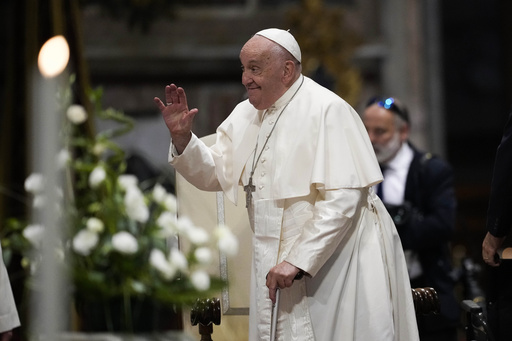
On Tuesday, the child protection board established by Pope Francis urged for improved access to information and compensation rights for survivors of clergy sexual abuse, marking a significant milestone in the church’s ongoing battle against this crisis. This recommendation came as part of the first global evaluation conducted by the Pontifical Commission for the Protection of Minors, which emphasized the need for systemic changes within the church across a variety of countries and institutions.
In their inaugural annual report, the commission presented a range of findings and suggested improvements, focusing on the church’s operations in twelve different nations, two religious orders, and two offices within the Vatican. One of the key critiques highlighted in the report pertains to the Vatican’s sex abuse office, the Dicastery for the Doctrine of the Faith, which was criticized for its lack of transparency and slow case processing times. The report points out that the office’s secretive practices can lead to re-traumatization of victims and foster a sense of mistrust within the community, particularly among those who have survived abuse.
The 50-page document represents a turning point for the commission, which has been working for over a decade amidst challenges in gaining traction within a Vatican environment that has often been reluctant to confront issues of clerical abuse. Established by Pope Francis in 2014 to guide the Vatican on protective measures for children against sexual abuse, Cardinal Sean O’Malley was appointed to lead this commission.
After facing significant internal turmoil and the resignation of several initial members who were disillusioned with the lack of progress, the commission has found a more stable direction in recent years. A primary focus has been on supporting churches in developing nations where resources are limited in creating and implementing adequate child protection policies and care for victims.
The report revealed serious cultural barriers in countries like Mexico that hinder abuse reporting, and it illuminated how financial constraints in Papua New Guinea result in inadequate training for church staff and insufficient victim support services. Additionally, the commission reported that essential items such as rape kits for criminal investigations are often too expensive in these regions.
The commission’s findings stressed the need for victims to have access to information pertaining to their cases, as the veil of secrecy and prolonged waiting times often exacerbate their trauma. One essential recommendation is the establishment of a specialized Vatican advocate or ombudsman focused on victim support.
The report further emphasized a concept of restorative justice, termed “conversional justice,” advocating for the victims’ rights to compensation, whether through financial reparations or public acknowledgment of their experiences to facilitate healing.
Moreover, there was a call for a more consistent understanding and definition of church policies regarding the protection of “vulnerable adults,” extending concern beyond the historical emphasis on the protection of minors. This broadening of focus is intended to address the need for safeguarding not just minors, but also religious sisters, seminarians, and lay individuals who may be at risk of exploitation by those in positions of spiritual authority.
Earlier this year, Pope Francis instructed the commission to compile this report, expressing a desire for a clear overview of where progress has been made and what areas require reform. It’s important to note that this initial report does not serve as a comprehensive audit of abuse occurrences but indicates that for future assessments, the commission will need more detailed statistical data from the Dicastery, which oversees abuse reports within the church.
The commission has called for strengthened collaboration and communication with this office, expressing satisfaction with their willingness to explore ways to assist bishops and religious leaders in supporting abuse survivors. Furthermore, the report highlighted the need for greater dissemination of information about the dicastery’s activities through academic presentations and the provision of resources to bishops aimed at ensuring appropriate justice measures.
Pope Francis has recently allowed Cardinal O’Malley to retire, extending beyond the standard retirement age for bishops, and hinted at a succession plan where the leadership of the commission would likely transition to its current second-in-command, Bishop Luis Manuel Ali Herrera.
